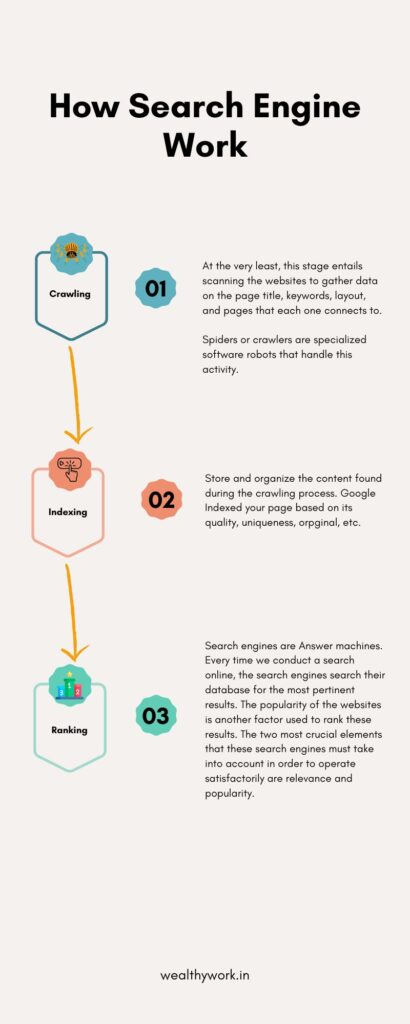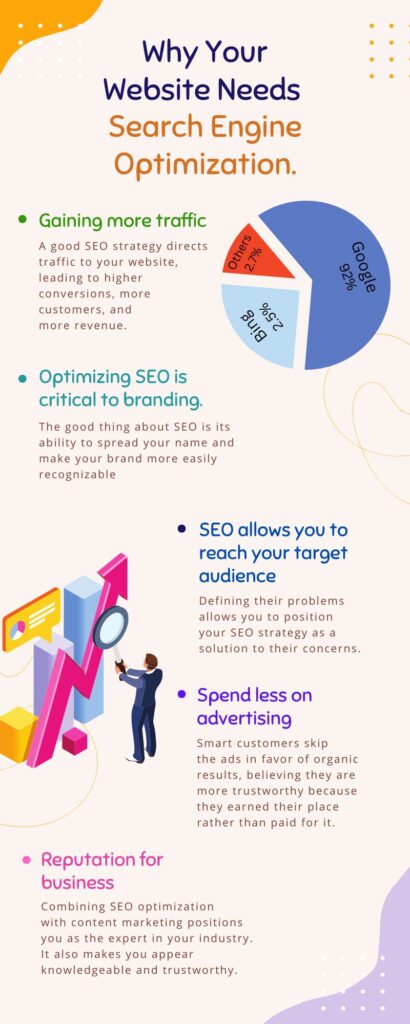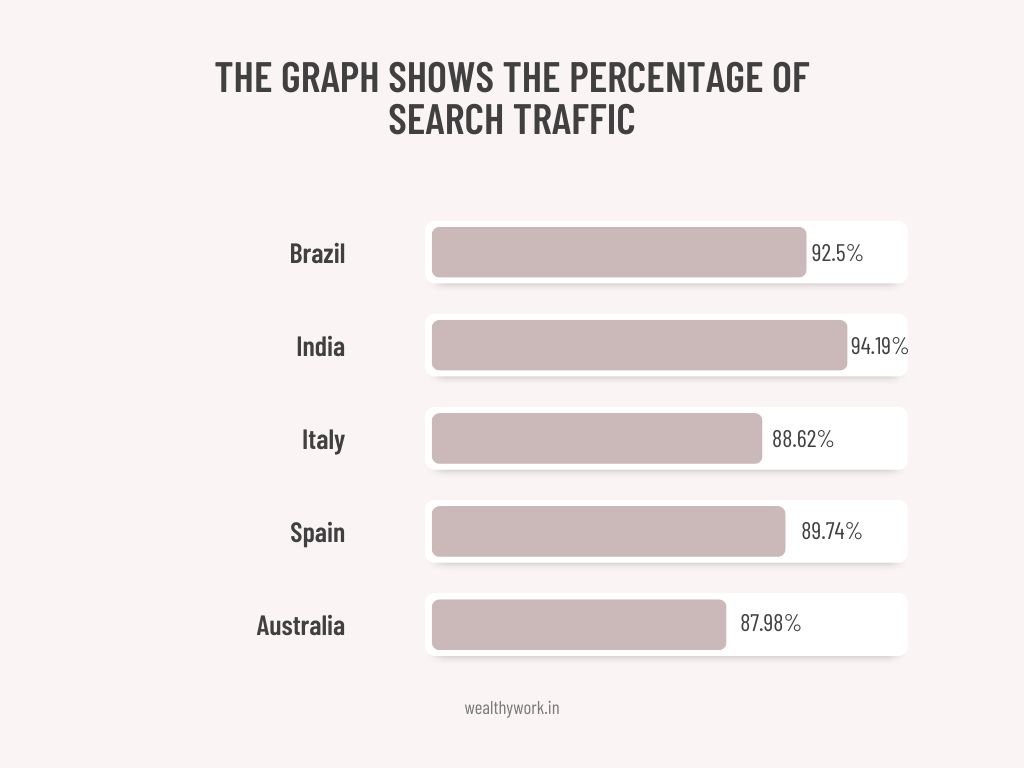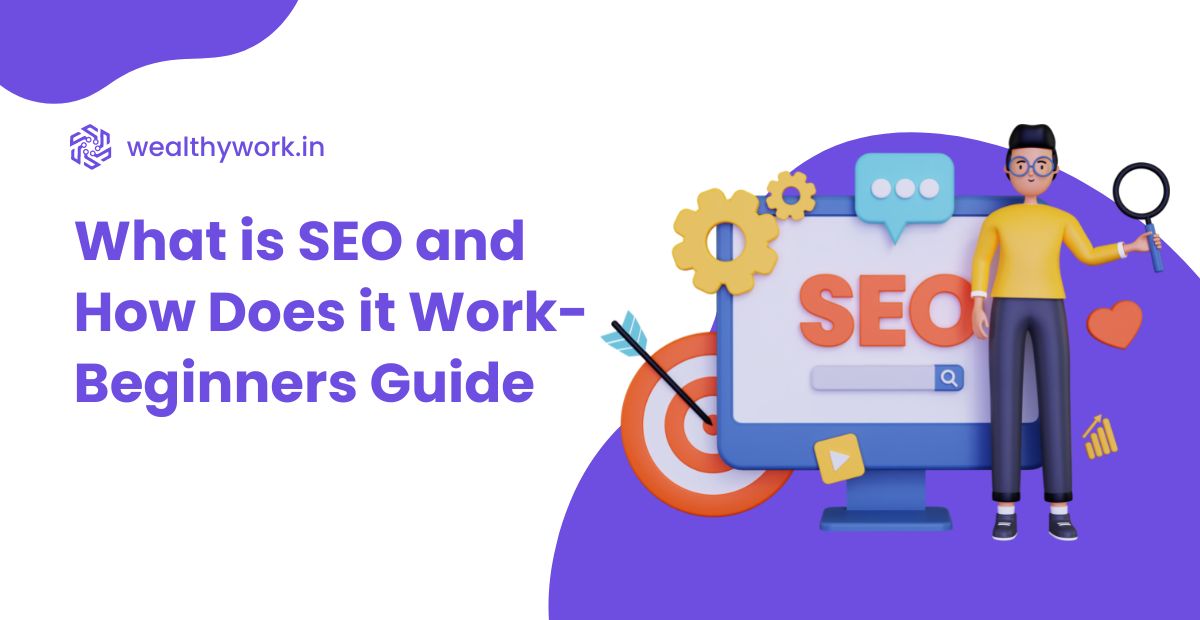Do you want complete information on SEO (SEARCH ENGINE OPTIMIZATION)? then you are at the right place. You will get complete information about what is SEO, how it works, types of SEO, etc.
SEO is the process of ranking a website or web page in search results. There are a number of different tactics in SEO and they include maximizing the number of keywords that appear in a page, optimizing the SEO of your site, and maintaining the SEO ranking of your site.
SEO is a constantly changing technology and is often difficult to consistently and accurately implement.
You’ll learn the different types of SEO that exist with this blog. And you’ll also learn how you can use SEO to your advantage. So if you’re interested in learning more about SEO, this is the blog for you.
What is SEO?
SEO is just a process of improving your site’s performance in terms of visibility, whenever people search for the products and services you are dealing with or what your site is about.
The better your site has visibility in search results, the better your service or business is going to grab the attention of the customers and it is going to improve.
Because organic search is the best and the most prominent way for people to discover your site, and access quality content, obviously it can be improved by SEO.
How Does a Search Engine Work for SEO?

Do you know what a search engine is? Search engines are basically searchable databases of web content. It has three main types. Let’s discuss all of them.
- Crawling-
Crawling is where a computer or internet bot or spider visits and downloads some kind of known URLs. It basically means how much of your web page is getting noticed by Google or any search engines. Because we all know that there are millions of blogs or web pages getting published every day on Google or search engines. Through crawling Google gets to know there is a site, it has web pages also, related to any niche.
- Indexing-
After getting crawled by the search engines, now it is time to index those pages on Google or any other search engine. Otherwise, how will your content get noticed?
After getting crawled it may take some time ( Depending on How you have worked on that content quality ) to get indexed.
Now if your site is not getting indexed by the search engines then there may be a few reasons behind that–
- Your site is not linked to an external website.
- Your site may be penalized by Google.
- Your site is very new and has not been crawled yet.
- Your site’s navigation is not correct for the robot to crawl it.
- Content quality not maintained or maybe you copied content from some other website.
So, these are some reasons behind not indexing.
- Ranking-
After crawling and indexing, the main part of what we’ve been waiting for has arrived.If you want to get organic traffic then you should rank on top in search engine results.. The ranking is also dependent on some factors excluding crawling and indexing. Some of those are-
- Your content is not up to the mark for the readers.
- It is not the exact answer to the searched questions.
- It may be the repeated answer, so Google will easily understand that.
- Or maybe you have written an article on a very old topic.
Why SEO is Important for your Website or Business?

If you have an online business or local store then how will people know that you are available online on Google search results?
According to the study 92% of people use Google to search their query, 2.5% people use Bing search engine and 5.5% people use other search engines.
So if you want to save your money on paid ads, you should optimize your website for SEO to get rank on search engine organic.
If your site gets rank in search results then you will get a good amount of traffic and it will save your money on paid ads.
Why SEO is important Let us discuss some points:
1. More Organic Traffic
Here, you can take your own examples also. Whenever you need to know something, the first thing you go on is Google. You will be surprised to know that more than 90% of people use Google search engines to get an answer that they do not know.
2. SEO allows you to reach the target audience
This is the most important benefit of SEO. SEO takes you to the target audiences. You can set or target what kind of audiences you want for your business or service. So, the conversation will become very high.
3. Spend Less on Advertising
To get more success or organic traffic people spend a lot of money on Advertising. That hits the budget to the pinnacle, and surely it was not in the plan. But if you can focus on doing the SEO in the correct way it will bring you the traffic you need. You do not need to spend money on Advertising.
4. You get quantifiable results
First, you need to understand quantifiable results. If your strategy is correct or the process of SEO is correct then you can measure how much traffic or customers are going to come to your business, or your service. And that will be quantified. They will be your true readers’ service takers or customers.
5. It improves your user engagement rates
I think you know about bounce rates when you are trying to learn about SEO. It shows how many searchers are fond of your blog or web pages. If you are doing the right kind of SEO then you will get the exact audience you need. Like if you have written a blog on a book review or summary then by SEO you can reach out to the searchers who are fond of these kinds of content. Then the engagement rate will improve and that is a very important ranking factor.
How SEO Works?

Every day almost 5 million blogs get published on Google on millions of topics. How would Google know that you also have a site and also have published blogs?
Maybe your content is far better than many blogs or sites, even then Google will not rank you, because firstly Google will take some time to identify your blog, as well as for a newcomer there will be a trust issue from Google on your content. Because Google doesn’t want to show any invaluable or bad things to the user.
Here’s how it works:
You should know that every search engine like Bing, Google, etc uses bots, spiders, and crawlers for all the content available on the internet.
Firstly, the crawlers started crawling from a known web page, and then followed the internal link, also the external links that the known page has in it to go to the other sites.
Like this, the crawler gets the information about the other sites also and understands what the pages have in them, and how it is connected with each other.
Now when a user types one query in the search box, then the search box uses the Complex Algorithm to show the most accurate answer to that query. And it can include images, videos, sounds, anything in it.
I just want to clarify something. There are a lot of factors that come into search engine algorithms or SEO factors to rank your site at the top on Google or any search engine.
Check our article on all Google algorithm updates that google uses when he crawls your site to get rank.
And the search engine uses these factors as ranking factors. I am one tentative list of the factors that mostly come under the SEO factors nowadays.
- The speed of your blog or site.
- The quality of content.
- The bounce rate (That means how much the readers are spending to read your content)
- The length of the content.
- The content is fresh or old.
These are some points you should always remember to rank your site. If you at least maintain these points, the chances to rank will grow high.
What are the Types of SEO

There are mainly three types of SEO. One is On-page SEO, Off-page SEO and Technical SEO. Both are very important to rank your site at the top. So, you should have an idea about both types.
- On-page SEO-
It is also known as on-site SEO. It is the process to optimize web pages or blogs to improve your website’s or blog’s ranking and as well as to get organic traffic. To improve you have to take care of HTML tags, Headlines, Meta descriptions, titles, etc along with good content and images.
Read our article on how to improve your On Page SEO to get more views and ranking.
- Off-page SEO-
It is also known as off-site SEO. It refers to the actions that you should take outside of your blog or website to improve your ranking on the internet or within the search engine results. Along with On-page SEO, it is also very important for ranking.
Like- Link building, backlink creations, guest post, article submission, image submission, etc.
How to work on Off Page SEO we have a detailed guide on it you can read by clicking here.
Ok, let me tell you about one more SEO type and that is Technical SEO.
- Technical SEO–
Mainly refers to server optimizations and websites that basically help search engine crawlers to crawl your website and to index your site. That can improve your organic traffic.
I have a detailed article on how to work on Technical SEO. Technician part of your site is also important for the ranking part.
Now, you should know that except for these three types there is a very important SEO strategy available. Let me explain a little bit about it-
| White Hat SEO | Black Hat SEO |
| It will find out ways to improve the user experience. | You can understand by the name “Black”that it tries to manipulate the Google algorithm to improve the ranking. |
| It tries to find out some genuine ways to bring organic traffic to the blog. | Sometimes it is very much deceptive to understand how it is really going to improve the ranking. |
Now, let me tell you about International SEO.
What is International SEO?
International SEO helps you gain a more organic presence in the international market. It helps you to reach your target audience in specific countries.
In many countries outside the United States, Google is the source of most search traffic. For example, Google accounts for 92.5 percent of the search traffic in Brazil. In India it is 94.19 percent.
The percentage of Google search traffic to a list of countries is shown in the graph below:

If you want to target any country then all you need to do is enter the hreflang code in the <head> paste here </head> section of your website.
Here is the code with different language and country:
link rel="alternate" href="http://example.com" hreflang="en-us" />(English-United state)
link rel="alternate" href="http://example.com" hreflang="pt-BR" />(Portuguese-Brazil)
link rel="alternate" href="http://example.com" hreflang="hi-IN" />(Hindi-India)
If you want more details about country code rad by clicking here different hreflang code and how to use.
How to Optimize for Google?
Do you know that Google has more than 200 ranking factors? And even a few years back Google used to use more than 10,000 ranking factors.
Google never revealed all of the ranking factors to use, but after studying and with some experiences we get to know about some factors that you also should know to improve your ranking.
1. Easy Crawlability-
Before ranking your content, Google should know that there are content or web pages that have recently been published on the internet. To understand, first Google needs to crawl that. To crawl Google uses a computer program that is called Spider.
To crawl Google firstly focuses on the pages that are already indexed on Google. And then it follows the backlink, internal link, or external links and tries to crawl and index them if they are relevant to Google or any other search engines. Also, Google follows the homepage most importantly and tries to crawl the other links present there.
To get the best experience with crawling, you should remember some important points, that are-
- You must do internal and external linking with every blog or webpage.
- The internal links must not be do-follow links.
- Should remove the no-index pages from your blog.
2. All pages Should be indexed-
As I discussed earlier, if you want Google to crawl your website or web pages fast and properly, then you can request Google for that. That will help you to get indexed and ranked very soon.
If your site pages are not getting indexed properly then you can read this article on how to index your pages.
3. Pages Should be mobile-friendly-
I think you should know that almost 92 percent of people use google or any kind of internet through mobile. And the number is increasing every year. Maybe you are also reading this, on your phone. Just imagine one thing, you are trying to open a webpage for a while, but it is taking more time to get open. Then what will be your experience?
You will be annoyed. So, it is very important that you make your site mobile-friendly so that the mobile user can read your blog or take your services so easily.
4. Make a better user interface-
The user interface is also very important. Because you are writing a blog or you have started a website, to get views or customers. Now, readers or viewers are coming, but they are facing problems with the site interface to find what they are looking for and they will leave your site. That will increase your bounce rate, and you will drop down in ranking. So, follow some good sites to make your site’s interface better.
Recently Google launched an algorithm on how to improve your page experience and User interface. I have an article on it you can read by clicking here.
5. Improve page Speed-
Google has now clearly mentioned that page speed now becomes a ranking factor. If your site is not responding or opening within the time or if it is not that fast, then Google will not rank that site ever. Because Google will not hamper their user experience by ranking your slow site. Does not matter if it has the best content. So focus on that.
6. Create content that matches with search intent-
I have given this example earlier also. That it is the intent that really matters. If you are writing articles or blogs that people do not need, then who will read that, and how will you get noticed and ranked?
Like- the people just want to know about the year of Independence. They don’t want to read an article on Independence. So, understand the intent first.
7. Get more backlinks-
As you know, backlinks are one of the most important things to rank on Google. There are many ways or websites available in the market or on the internet that can provide you a decent without spam backlinks for free. But if you want then you can pay for that by approaching other sites or can apply for a guest post.
You can check our article. I write there 30 free guest post sites available in the market. You can visit the site owners and send a pitch for Guest post.
8. Improve Domain Authority-
This is something, which is directly not in your hand. It will grow over time. But some important things you need to remember to grow fast are to write genuine content, your content should not have any wrong information, and content should be plagiarism free.
When your site gets more views and engagement then Google notices your site and starts improving its ranking on top.
When your site starts ranking that time your Site Domain Authority also gets increased.
9. Improve Content Quality-
“Content is the King” If you want to be a long-time player in this market, or any market rather, you need to improve the quality of the content over time. You know, it can’t be the same as when you started. Always try to learn and improve.
10. Update Content Regularly-
Whenever you are writing blogs or content just remember that you have to update the content or the information time by time. Like if you are writing content on a scheme, then you know that the schemes got updated by the government many times. So, you need to update that as well. It’s not like you just write one time and not update. Then slowly you will lose the ranking and views.
What is a Sitemap in SEO?
A sitemap is a blueprint of your website that helps search engines find, crawl, and index all of your website’s content. When search engines discover new content on your site, they add it to their indexes to ensure their users can find it.
Your sitemap allows you to have more control over the indexing process and helps you keep track of what is being indexed.
There are two types of sitemaps, HTML and XML formats. An HTML sitemap is a text document that lists the website’s contents in the form of hyperlinks. You can create an HTML sitemap manually or use a special program to do it.
An XML sitemap is a file that allows search engine crawlers to fully understand the organization of your site’s content, including its structure and hierarchy.
I think you can understand that the sitemap has four main types-
- News Sitemap.
- Video Sitemap.
- Image Sitemap.
- Normal XML Sitemap.
Frequently Ask Questions
What are some Good SEO keywords?
There is no exact answer to this question. The best keywords are not fixed for all the blogs or sites. It depends on your niche, relevance, and volume. If you want to find some highly searched keywords on Google, then that will come from your experience and somewhere you can take a little bit of help from some websites that can provide data.
What are the main SEO types?
There are mainly three types of SEO. And that is-
1. On-Page SEO. 2. Off-Page SEO. 3. Technical SEO.
Conclusion:
We hope you’ve enjoyed our article about SEO. If you need to learn more about SEO, you can discover more about it on our blog. We’ve had SEO under the microscope for several years now, so we know that there is much more to learn about this subject.

Comments are closed, but trackbacks and pingbacks are open.